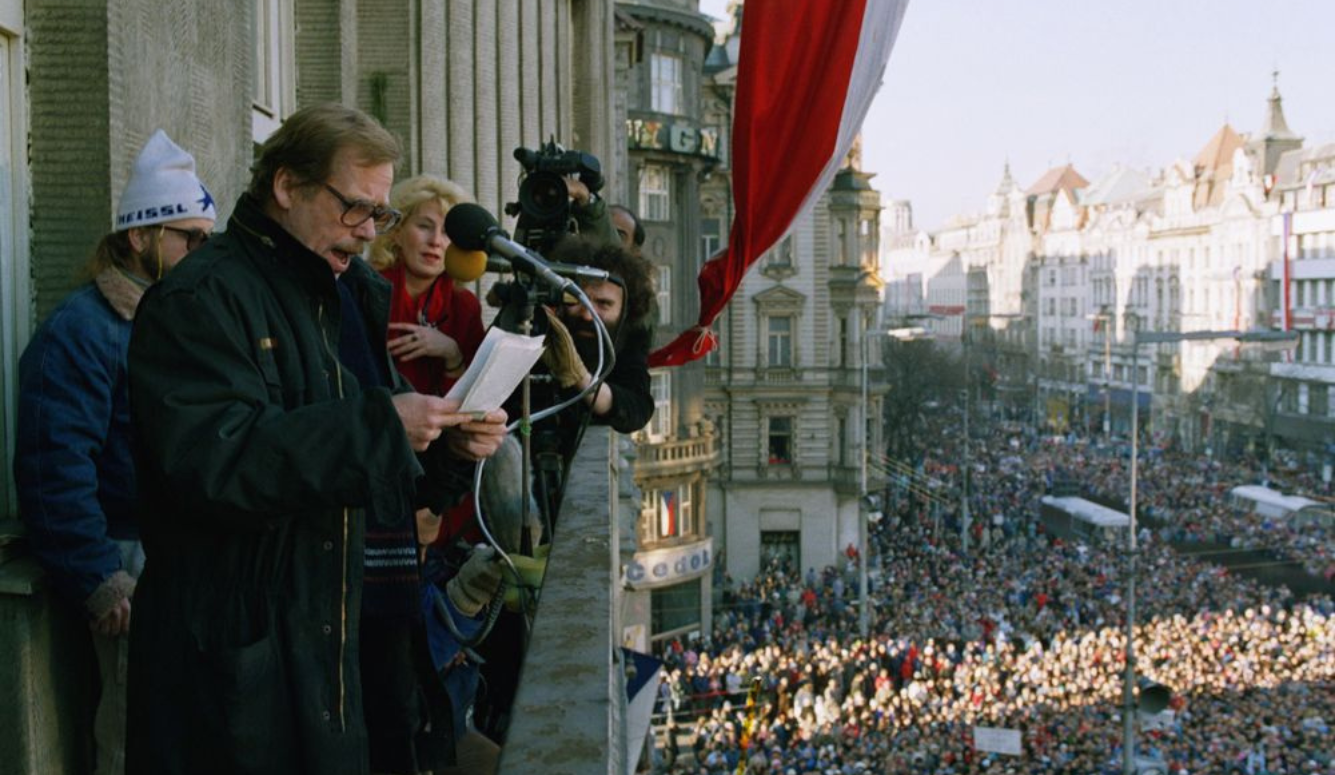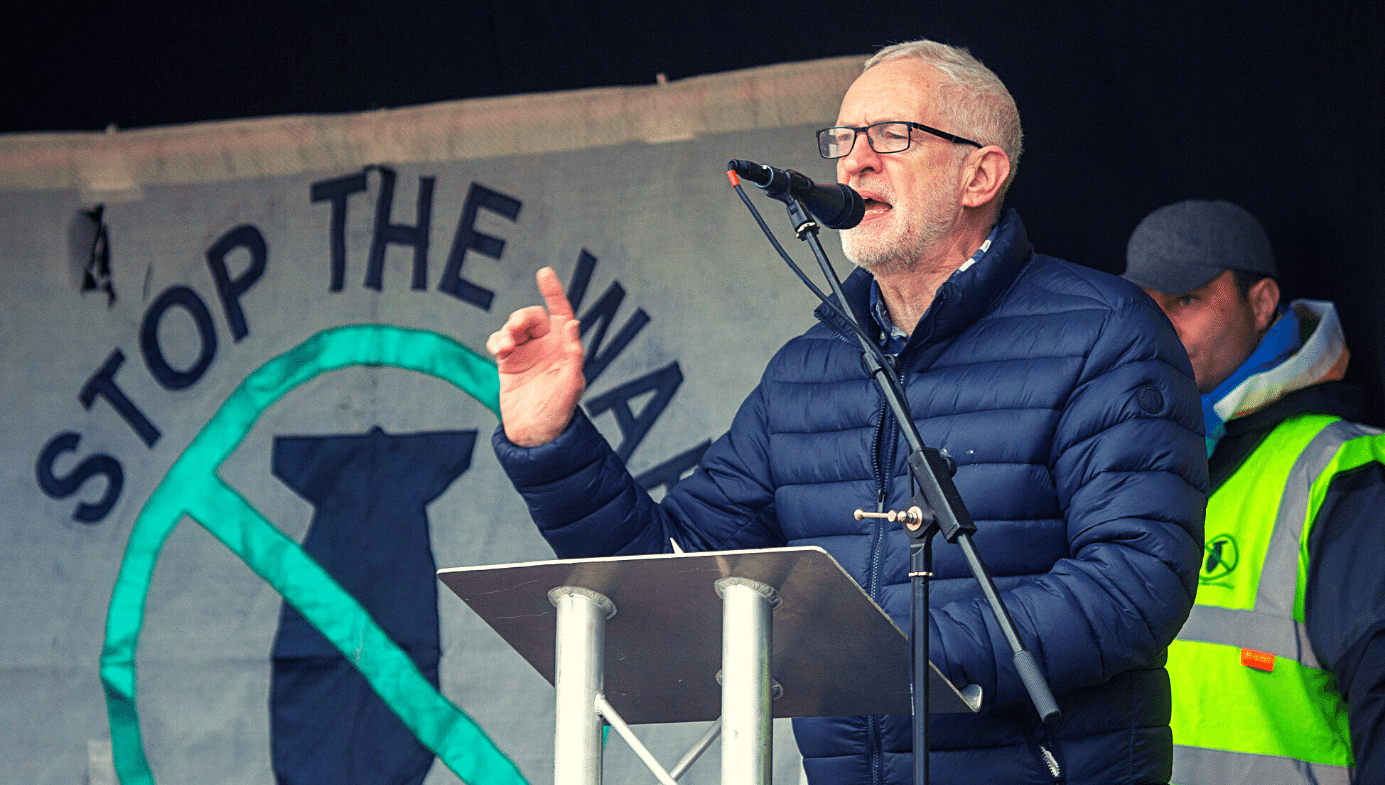Politics
When Havel Met Biden
Far from being a project of US imperialism, NATO expansion has been a process driven by small and vulnerable countries.

There has been much discussion in recent years about the commitments US officials may or may not have made to Gorbachev in 1989 regarding NATO expansion when East Germans were finally freed from the Stasi and Vladimir Putin acquired the grievance he has been nursing ever since. It is not often acknowledged that entertaining this Russian talking point capitulates to the sphere-of-influence politics of the Cold War. In order to accept the premise that Russia could have vetoed former Soviet or Eastern bloc states from ever choosing to enter into certain international alliances, it is first necessary to deny those states full sovereignty.
The expansion of NATO since the end of the Cold War is often discussed solely as a US policy decision. But this ignores the goals and interests of the small countries, whose politicians made the case for NATO membership much more forcefully than anyone in Washington, and often in the teeth of American doubts and objections. The most brilliant of these politicians was Václav Havel, the great moral leader of Czech resistance to Soviet “normalisation” after 1968, who became the first elected president of the democratic Czech Republic after the Velvet Revolution.
Upon assuming power, initially as the final president of Czechoslovakia, Havel had flirted with the idea that the Czechs and Slovaks could attain the freedom and prosperity of their Western European neighbours without the need for the security guarantees upon which those neighbours had relied since the late 1940s. As he saw it at the time, the international picture appeared to be changing in more hopeful and peaceful directions. In the early summer of 1991, Gorbachev had sent his deputy, Gennady Yanayev, to Prague at Havel’s request to sign the document that dissolved the Warsaw Pact. Since Havel had secured his country against any future “fraternal assistance” from Soviet troops, he could see no immediate reason to rush towards NATO. Like the elder President Bush, Havel had been optimistic about the “Peace Dividend”: the idea that levels of military spending could be drastically reduced with the end of the Cold War, and that the money saved could be used to build more prosperous and flourishing societies, which would be their own guarantee of peace. It was a utopian time.
The incident that changed his mind was the failed coup, which took place a few weeks later in Russia. The KGB ousted Gorbachev in a futile attempt to save the secret police regime that was collapsing under a great wave of human emancipation. The leader of that coup was the same Gennady Yanayev that Havel had met in Prague. The experience of signing the Warsaw Pact out of existence had been a humiliating one for Gorbachev’s deputy, who had sat through the ceremony in stony silence. But Havel had not initially comprehended the possible consequences of Russian humiliation. The degrading act of co-signing the document with the one-time political prisoner Havel—a living embodiment of the power of the powerless, which had terrified Soviet leaders since the formation of the Cheka—might even have been what caused Yanayev to resolve upon revenge. In their efforts to salvage the Soviet empire, Yanayev and his “gang of eight” became the first representatives of Russian revanchism. Watching them embark upon their coup in August 1991, Havel realised that they would not be the last.
Havel quickly assimilated the lessons of his country’s history. The Czechs had experienced only the briefest period of independence after the collapse of the Austro-Hungarian Empire at the end of the First World War. From March 1939, they had been occupied by the Nazis, having been sold out by their ostensible allies, Britain and France. During the period of the Nazi-Soviet Pact, Hitler and Stalin had agreed that, in the totalitarian world order of the future, the Czechs would remain under the German sphere of influence. Rescued from this future—irony of ironies—by the Red Army, their state became a Soviet satellite for nearly half-a-century.
It had often been the fate of the small nations of Europe to be dominated by the larger ones. By the second half of the 20th century, this lesson had been so well learned in central Europe that History itself (at least, when capitalised in the Hegelian manner to suggest destiny) had become suspect. “Never forget,” wrote the Pole Witold Gombrowicz, “that only in opposing History as such can we resist the history of our own day.” Which was to say that history need not always proceed in the direction prescribed by the prophets of imperial destiny. An important lesson of the 20th century was that, while appeasement encouraged aggressors, strength deterred them. And it had been the strength of the United States which had changed the course of European history.

NATO, Havel came to understand, was the only way to guarantee the future of Czech independence. During a speech delivered at the NATO summit in Prague in November 2002, he said:
Europe should perhaps remind itself, more than it has before, that the two greatest wars in the world's history to date grew on its soil from conflicts between European countries; and, that on both occasions it was the United States—which had no part in the outbreak of those conflicts—that eventually made the decisive contribution to the victory of the forces of freedom and justice. And more than that: Who knows whether Western Europe would have been able to hold its ground during the Cold War and withstand the Stalinist, or the Soviet or the Communist, expansion if it had not been backed by the immense potential of strength brought in by the United States, among other things within NATO?
Still, Europeans have often struggled to convince Americans that it is in their interests to support freedom on the European continent. Roosevelt was not powerful enough to stand up to the America First movement, regardless of Churchill’s appeals, until Pearl Harbour; and it was the Mayor of Berlin, Ernst Reuter, who had to prevail upon General Clay to back the unpopular idea of the Berlin Airlift. Today, Zelensky and the Ukrainians understand that NATO admittance is the surest protection of long-term peace for their country, but NATO’s leaders fear the consequences.
Havel, too, had to maintain his enthusiasm for NATO during some trying years. When he died in 2011, Paul Berman wrote a lengthy obituary for the New Republic in which he recalled a scene he had witnessed when Senator Joe Biden, then chairman of the Senate Foreign Relations Committee, had met Havel to discuss the Czech NATO application in 1997. Biden was anxious to impress upon Havel that NATO’s open-door policy was not an open invitation, but more like a begrudging acceptance that applications would be considered on their merits. And there were many on Capitol Hill who insisted that the Czech application had few merits, and that its acceptance would only inflame the Russians.
“Mexico is fifty times as important to us as you are!” Biden said. Havel’s cabinet minister spoke up. He explained that the Czech Republic understood that each country had to pay its way. The minister wanted to know the goals. He wanted to be assured that everything had been realistically conceived. Biden exploded. “Let’s get this straight,” he said. “No one is asking you to join.” Biden had no intention of conducting a negotiation. “You would like to join,” he told the Czech leaders. They were also free not to join. And America was free to accept the advice of Senator Dodd and the champions of isolationism and to turn away from Europe altogether. He pointed out that, from an American standpoint, Asia, too, was extremely important, and not just Mexico. “Democracy is a bitch,” concluded Senator Biden.
Havel recovered from this inauspicious first meeting with Biden, and two years later, took the Czech Republic into NATO. But he was not satisfied merely by what he had achieved for his own country. In his remaining years in power, he lent his voice and his moral authority to the causes of other small European countries seeking admission. Russia made a particular show of disapprobation when the former Soviet Republics of Lithuania, Estonia, and Latvia launched a NATO bid in the early 2000s. In response, Havel spoke with clarity about what Russia’s accusation of “NATO encirclement” really meant: that Russia should continue to dictate the future of three states that it had forcefully incorporated into the Soviet Union as fruits of Stalin’s pact with Hitler in August 1939. “It is my profound conviction,” Havel wrote in 2001, “that Russia does not deserve that we behave towards it as we would towards a leper, an invalid or a child who requires special treatment and whose whims, no matter how dangerous, must be understood and tolerated.”
Havel was the leader of one small country in Central Europe, but his story has its parallels all over the part of the continent that was liberated from the Soviet orbit in 1991. Far from being a project of US imperialism, NATO expansion has been a process driven by the small and vulnerable countries, which are also the most fundamentally anti-imperialist ones, since their continued existence is predicated upon their ability to deter imperialist neighbours. While many of the threatening imperialisms of the European past have happily vanished, the Russian one maintains its claims. It was Havel’s conviction that it would continue to do so until it could come to terms with its own borders. “If I do not know … where I begin and where I end,” he wrote, “my relations with those around me will inevitably be tense, full of suspicion and burdened by an inferiority complex that may be hidden behind pompous bravado.” It is for this reason that a Ukrainian victory—in teaching the Russians where their borders lie—could end the Russian imperial story for good, and hasten the day when a civilisation at ease with itself can live in harmony beside Europe.






